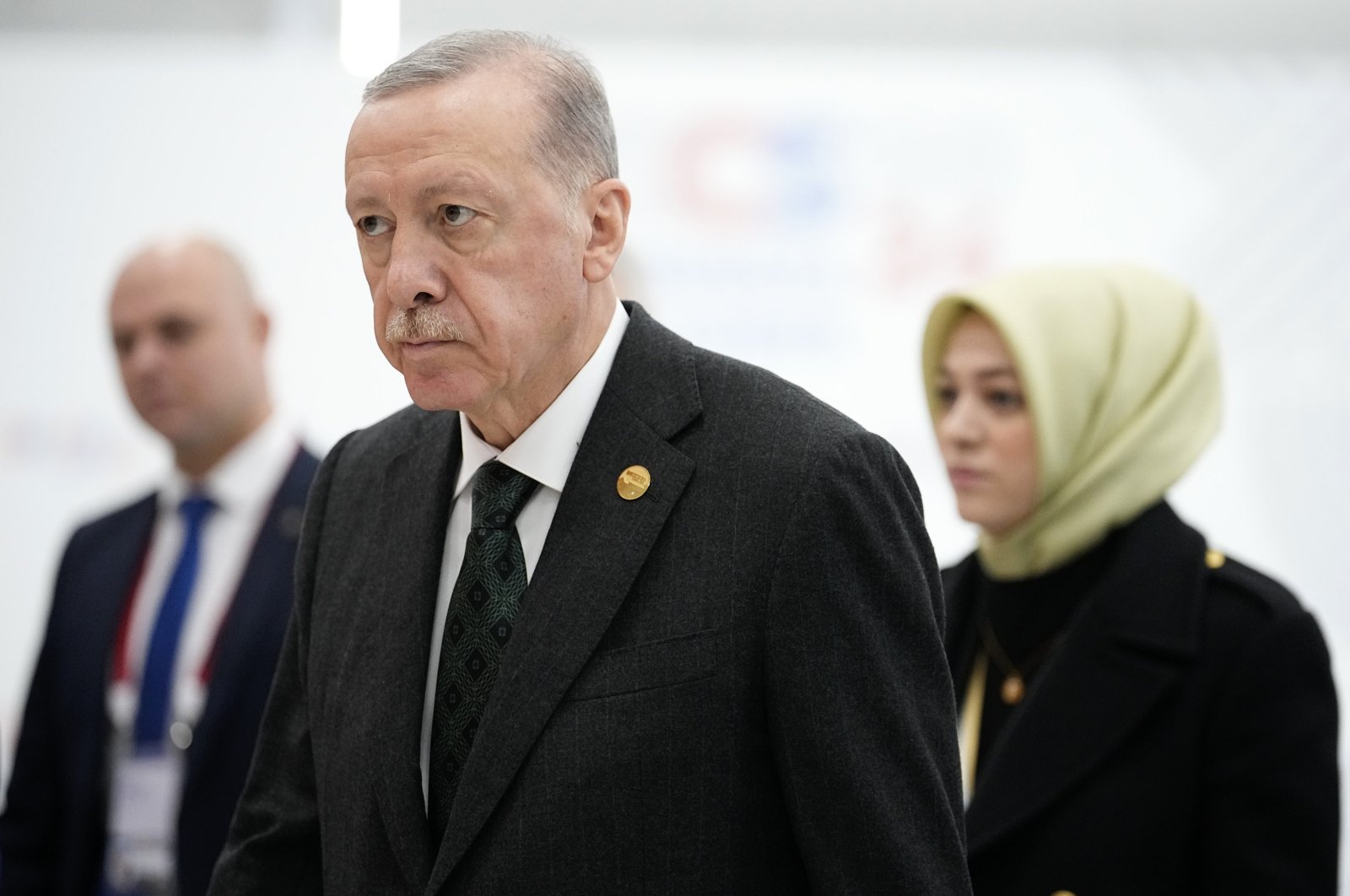
Operations against the U.S.-backed PKK/YPG in Syria and Iraq will continue until the end as Türkiye remains uncompromising on its anti-terrorism policy, the Turkish president says on his way back from a BRICS Summit in Russia after a PKK attack that killed five people in Ankara earlier this week
President Recep Tayyip Erdoğan on Friday said the two perpetrators of a deadly terror attack in Ankara infiltrated Türkiye via Syria and vowed Türkiye would eradicate PKK terrorism "at its source.”
"We have especially discovered the terrorist attack was carried out after an infiltration via Syria and operations targeted 40 different targets overnight,” Erdoğan told reporters on a flight back from Russia's Kazan where he attended a BRICS summit.
Türkiye confirmed on Thursday that PKK/YPG terrorists were behind the attack on Turkish Aerospace Industries (TAI) that claimed the lives of five people.
Intensifying airstrikes destroyed hundreds of PKK/YPG targets in northern Iraq and Syria, as well as a ”significant number” of terrorists since Wednesday’s attack.
Türkiye will not compromise on its multilateral and all-encompassing policy of eradicating terrorism at its source, Erdoğan stressed, repeating a point Ankara has been touting in its operations against the PKK and its Syrian offshoot, the U.S.-backed YPG.
The PKK took up arms against the Turkish state in 1984 to achieve a so-called Kurdish self-rule in southeastern regions and is designated a terrorist organization by Ankara, as well as the United States and the European Union.
In Syria, the group operates through YPG, which has exploited the power vacuum during the Syrian civil war to occupy swathes of oil and gas-rich land and create a self-styled entity in the country’s northeast, something opposed both by Ankara and the Assad regime in Damascus.
The terrorist group has found a major ally in the U.S. to fight against Daesh terrorists and justifies its presence as a frontier against remnants of Daesh, a major strain on Turkish-American relations.
Erdoğan said the PKK/YPG was "bound to be abandoned by the United States after their time is up.”
"The terrorist group is wasting its efforts to seek the patronage of certain Western countries,” he added.
He argued the U.S. was "using” the region’s terrorist groups to serve American interests and the security of Israel, slamming Washington’s monetary and military support to Tel Aviv in the meantime.
"Türkiye has to consider an infiltration from Syria or any other place at any given moment,” Erdoğan pointed out. "Therefore we have to ensure our security.”
Türkiye currently controls two large strips of territory along its Syrian borders after expelling the PKK/YPG forces in successive campaigns. The aim is to create a security strip along its Syrian and Iraqi borders and sever the ties between the YPG and PKK strongholds in northern Iraq’s Qandil region.
Ankara often calls on its NATO ally to cut off its unconditional support of the YPG and the international community to take steps to ensure the territorial integrity of Syria threatened by the YPG.
Call to Assad
"We expect the Syrian administration to take steps with the understanding that a sincere and realistic normalization with Türkiye will benefit them too,” Erdoğan continued, warning of a "ring of fire in our region ever getting closer.”
The Turkish president over the summer voiced a plan to invite his estranged Syrian counterpart Bashar Assad for talks to reconcile ties severed in 2011 after Syria’s civil war began and Ankara deployed troops to back opposition forces and stave off PKK/YPG terrorists in the north.
Since 2022, top Syrian and Turkish officials, defense and foreign ministers, as well as intelligence chiefs have met for Russia-mediated talks, with Moscow pushing for a detente.
The last talks in Moscow, including Tehran, fell apart in May 2023.
Russia is still trying to facilitate a meeting between the two countries’ leaders to mend ties. Iraq also said in July that it may seek to try to bring the two leaders together.
Assad initially said Damascus was open to all initiatives to revive Turkish-Syrian relations "as long as they are based on respecting the sovereignty of the Syrian state over all its territory and fighting all forms of terrorism.” Later in July, he made clear that while he wanted Turkish troops to withdraw from Syria, that was not a precondition for talks.
Since then, however, the process has been essentially frozen.
Erdoğan was optimistic, expressing hope to see "constructive steps soon” on the matter.
He also said he asked Russian President Vladimir Putin for assistance in ensuring the Syrian government engages with Ankara to normalize ties during their meeting in Kazan.
"Russia's influence over the Syrian government is known ... We made a request to Mr. Putin to ensure the response of (Syrian President) Bashar al-Assad to our call. Will Mr. Putin make a call for Assad to take this step? We leave that to time," Erdoğan said.
Solidarity for Palestine
Turning to Israel’s war on the Gaza Strip that has killed at least 42,000 Palestinians, mainly women and children, since last year, Erdoğan said he observed an "uncompromising stance” from Western nations like Italy, Spain, Ireland, Norway and Slovenia at the BRICS summit.
He said Türkiye has launched an initiative under the U.N. to impose a comprehensive arms embargo on Israel, as intensified Israeli attacks on Gaza and Lebanon continue to claim hundreds of lives every day.
Erdoğan underlined that the number of countries supporting Ankara's call for an arms embargo on Israel is growing.
"We hope to succeed in this as Alliance of Humanity and open the door for lasting peace," he added.
